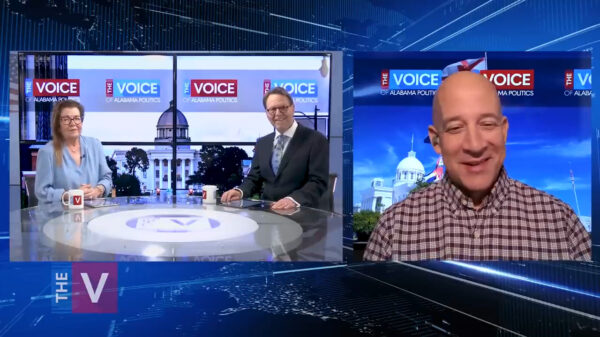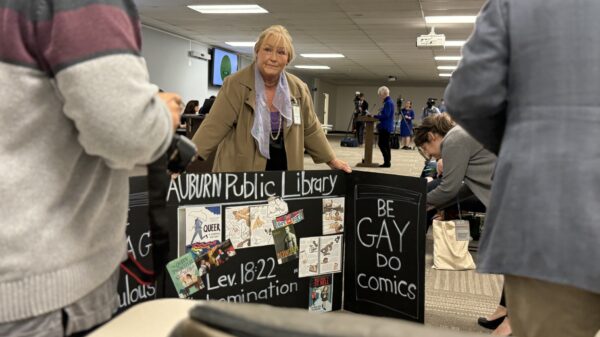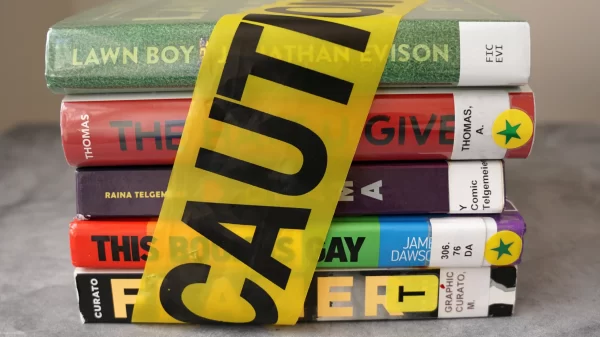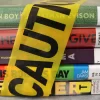The Network of Alabama Academic Libraries celebrated the 40th anniversary of its founding during an event held at the University of Montevallo on Oct. 3.
Speakers at the event discussed the history of NAAL and its initiatives, as well as the organization’s future amid ongoing attempts to control the available content and governing bodies of Alabama’s public libraries.
University of Montevallo President John W. Stewart III, welcomed attendees from university libraries across the state, saying, “Let’s face it, it’s a tough time to work in the libraries. It’s a tough time to be in higher-ed, and so thank you for your resilience and for—for doing what’s most important and that’s keeping students first.”
NAAL was founded in 1984 in response to a study by the Alabama Commission on Higher Education, which cited deficiencies in the information and technological resources available in Alabama’s post-secondary libraries from institution to institution.
NAAL was the United States’ first statewide consortium that included both public and private libraries as partners. Since its founding, NAAL has expanded to include all four-year university libraries in Alabama.
According to its website, NAAL has developed programs to promote information sharing amongst academic libraries in order to improve the quality and quantity of information available within them, as well as to eliminate the financial, physical political and technological barriers to information faced by Alabama students.
Current NAAL programs include the Alabama Virtual Library, which provides free access to online databases for K-12 and university students; the Alabama Digital Preservation Network, a network providing Alabama academic institutions, state organizations and cultural heritage organizations low-cost digital archiving solutions; and Alabama Mosaic, a digital repository of “unique historical treasures” from Alabama’s archives, museums and other digital repositories easily accessible online.
Following a video presentation highlighting the history of NAAL and its initiatives, speakers expressed the importance of promoting freedom of information in academic libraries during a time in which debates regarding library content has become increasingly prevalent.
“To some, libraries are the boogieman of the culture wars,” said ACHE Executive Director Dr. James Purcell. “Legislation and local board policies are making it hard for libraries to do their work—making it hard but not impossible.”
Purcell argued that academic libraries must balance their defense of academic freedom while maintaining a positive relationship with the communities they serve.
“Libraries should remain places where individuals can explore different perspectives, think critically and engage in civil discourse,” Purcell said. “But my bureaucratic advice would be incomplete if I didn’t remind you that we all have to recognize that we have to balance our freedoms with local perspectives.”
Purcell continued, “We need to engage with our communities, listen to their concerns and seek common ground, we need to be respectful to their perspectives, after all they support us financially.”
The night’s keynote speaker, Dr. Jim Vickrey has served at six universities during his time as an educator, including as UM’s president from 1977-1988.
During his speech, Vickrey emphasized NAAL’s history of innovating collaboration and information sharing amongst Alabama’s academic libraries and spoke on historical and contemporary threats to limit library content.
Vickrey emphasized the significance of NAAL’s founding saying, “Since the responsibility of libraries has long been seen as the exclusive domain of individual institutions, and it was up till that time, that development was a remarkable one.”
“Since NAAL’s implementation, tens of thousands of students have used its resources, countless numbers have visited its website from wherever they are, and it has saved the state millions of dollars 1.7 million in 2024 alone,” Vickrey said.
Vickrey reported that NAAL’s collection has grown from 6.3 million physical books in 1984 to 11.1 million physical books, pieces of media and serials as well as 21.3 million digital and electronic materials and databases. Currently, there are 32.34 million library collectables available throughout the state at each NAAL campus.
Vickrey emphasized NAAL’s place as a trailblazing initiative innovating academic libraries both in the state and across the nation.
“No wonder other states have followed our lead. In fact, states almost immediately began to develop the very same kind of network.” Vickrey said. “What I’ve always wondered was why didn’t Alabama follow its inspiration to a greater extent?”
Vickrey expressed his belief that the network is the standard to judge cooperative statewide programs in Alabama but criticized the state’s failures to continue being an academic inspiration for other states, saying, “Alabama has too infrequently enacted such models to inspire us and others.”
Vickrey went on to discuss the history of censorship in Alabama’s public libraries and archives beginning with his childhood in Montgomery during the 1950s.
Vickrey said that, as a child, he loved exploring the Alabama Department of Archives and History building, but soon realized the state’s archives were not welcoming to or representative of Black Alabamian’s history and culture.
“What about their archives and history?” Vickrey asked. “They were not represented in the archives and history building that I knew, because it was founded with a flawed mission.”
Vickrey commended former ADAH director Ed Bridges and the department’s current director, Steve Murray for helping make the department’s records more inclusive. This is progress Vickrey said has been threatened by recent attempts in the state legislature for increased control over the archive’s content.
“Now a few legislators are trying to control the Department of Archives and History for partisan political purposes and are evening threatening its appropriation,” Vickrey said.
SB5, pre-filed for 2025 and sponsored by Sen. Chris Elliott, R-Josephine, would revoke the ADAH Board of Trustee’s ability to appoint its own members. The bill would introduce a rotating system for appointing board members, giving responsibility to state officials including, the governor, lieutenant governor, Speaker of the House and President Pro Tempore of the Senate.
It would also give the governor, currently an ex-officio board member, voting rights on the board.
Elliott was among several Republicans who criticized the Archives for hosting a LGBTQ+ history presentation in June 2023. Elliott introduced a bill in July 2023 that failed to pass which would strip ADAH of $5 million in response to the event.
“The Alabama Department of Archives and History is finally living up to what should have been its mission and to its potential and a few naysayers want to drag us back to the bad old days in which people of color, the LGBTQ community and people without much political clout are just ignored all together,” Vickrey said.
Vickrey went on to emphasize the danger of current efforts to control the content and governance of local non-collegiate public libraries.
“Non-collegiate public librarians are under attack in our state. They’re under attack by a small minority of Moms for Liberty and other groups and we must not stand by and let it continue to happen.” Vickrey said. “They are being threatened by a few parents who want librarians to baby-sit their children in loco parentis.”
“Here and in several other states gender and racial zealots are, busy, busy, busy causing problems for a number of public librarians—at least the ones who haven’t been fired,” Vickrey said.
Vickrey said that attempts to restrict library content are not a new phenomenon, saying, “In the 50s, it was communism. In the 60s and 70s, race, sex and anti-war rhetoric. In the 80s, liberalism, creationism and evolution. In the 90,s sex and liberalism. And, in the 2000s, gender and the nonsense labeled “wokeness”—a term looking desperately for a definition.”
Vickrey continued, “Such abstractions are always lurking in the weeds, looking for opportunities to be called on stage and to be the latest manifestation of anti-intellectualism.”
“Biblio-purists are never satisfied,” Vickrey said, emphasizing that threats to local public libraries must be taken seriously by collegiate librarians as well.
“Why should that be limited to local public libraries? There is no guarantee that it will be, nor that lists of disfavored books will be. Before that happens, and to encourage local public librarians, we should be visibly standing up for them. Who else is going to stand up to the bibliographical bullies if we don’t?” Vickrey said.
Vickrey called for academic librarians to take a more active role in challenging threats to control library content and governance.
“We sit back, and we don’t say what we’re for and it makes them easier to cave in as they’ve done,” Vickrey said. “Some of our organizations have addressed it but not many individuals in key opinion-leader positions have spoken out on what’s happening.”
Vickrey highlighted his role asking for the establishment of an annual banned books exhibit at UM’s Carmichael Library during the late 1970s. He expressed joy that the tradition continues to be observed at UM in 2024 and has spread to other Alabama university libraries as well.
Vickrey said that similar initiatives demonstrating public support for freedom of information in libraries must be taken to make legislators see beyond the influx library censorship efforts backed by groups like Moms for Liberty.
“The best thing about such developments is they communicate a social value to the public and can warn others away from censorship. Legislators need to know that because they hear mostly only from whom? People who are mad about something,” Vickrey said.
Vickrey also criticized Governor Kay Ivey’s role in attempting to restrict public library content. In October 2023, Ivey requested that the Alabama Public Library Service adopt new rules to restrict children’s access to “inappropriate literature.”
APLS voted in May to adopt new rules mandating that “material deemed inappropriate for minors” be kept away from a library’s youth section.
Vickrey said that he has known Ivey since they served on the University of Auburn Student Government Association together. Vickrey recounted conversations the two had on a night during his UM presidency, in which Ivey was a guest of the university.
“We spent the entire night talking about what we would do if we were ever put in positions of leadership in Alabama to move our state forward on race, on education on other things. Early in her administration, I wrote Kay a note reminding her of that conversation. She’s not speaking to me now,” Vickrey said.
Vickrey ended his speech by reasserting that academic libraries are not immune to government censorship. He cited the removal of hundreds of books from New College of Florida’s library in August, many of which related to gender issues.
This came after Florida Gov. Ron DeSantis replaced six of the school’s 13 trustees in January 2023 with the intention of pushing the university curriculum in a more conservative direction.
Vickrey said, “That could happen on any campus in this state if a governor appointed like-minded trustees to the boards of the universities.”
Vickrey reminded the audience, “We must never forget that the Dark Ages followed the destruction of the Library of Alexandria and other such libraries, who were sacked, do you remember who sacked all those libraries? Christians run amuck.”





















































